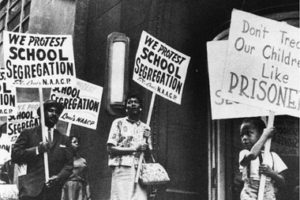As part of the Civil Rights Act of 1964, a national survey on inequality was commissioned to assess the degree of segregation of students and teachers, and its relationship to student achievement. The findings were discussed in a report titled Equality of Educational Opportunity by lead researcher James S. Coleman.
The study used “indicators of educational quality” to determine whether schools offer equal educational opportunity. Researchers looked at both “school inputs” such as curriculum, facilities, practices, and teacher and student characteristics as well as “outputs” as judged by standardized achievement tests. They did so with the warning that a “statistical survey can give only fragmentary evidence” of a school environment.
This research model is called “an education production function or input-output model.” It is the type of model economists use to assess “how an economic process works in a particular firm.” It “allows for aggregate analysis without requiring an examination of the details of what happens within a particular firm or school.”
Equality of Educational Opportunity: The Coleman Report
The dominate “take-aways” frequently quoted from The Coleman Report are:
1) family background and socioeconomic status have more effect on student achievement than school resources, and
2) that disadvantaged blacks show higher achievement in racially mixed schools.
The first take-away fed the “funding has little effect on achievement” argument and the second led to forced busing to racially integrate schools, which produced the unintended consequence of “white flight.”
The overlooked or forgotten finding was this:
The “pupil attitude factor, which appears to have a stronger relationship to achievement than do all the school factors together, is the extent to which an individual feels that he has some control over his own destiny…”
This is largely a consequence of a person’s experience in the larger society” and is “not independent of his experience in school.”
What happens in schools and communities matters. School climate and culture matters.
#####
Keep reading The Road to Educational Quality and Equality that started with The March Begins. Next up, Still Searching for Solutions?


